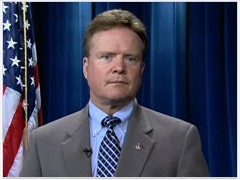
April 30, 2007

Today is a day for Vietnamese around the world as significant as the distinctions that we often make between B.C. and A.D. 32 years ago today, the communist forces from North Vietnam finished their conquest of the South, and South Vietnam ceased to exist. Ho Chi Minh liked to say that the motivation for pursuing this war was what he called doc lap va tu do, which meant independence and freedom. If we were to discuss independence in the sense of removing foreign involvement at that moment they were, arguably, correct. But if we were to discuss true issues of freedom, the aspirations for freedom for millions of people in Vietnam ceased on that day.
Some like to call the conquest of South Vietnam "liberation," but for millions of Vietnamese it was a loss of everything, including their country. A million people were sent into re-education camps. 240,000 of them stayed in those camps for longer than four years. Some as long as 18 years. 56,000 died in those re-education camps. An estimated one million people jumped into the sea during this period, some with more than a 50% chance of dying. And many of them ended up in this country. We currently have, today, in this country, two million people of Vietnam descent.
I do not want, at this moment, to re fight the Vietnam War. Nor do I want to dwell to much on the differences between the Vietnam War and the present war. But I've seen people on both sides talk about the Iraq War as if there were some correlation to Vietnam. And I would like to say that, for those who worry about how we withdrew from Vietnam, there's not a parallel. For those who worry, quite frankly, about how we went into Vietnam, there's not really a parallel. These were different continents, different government systems, different issues with respect to our national objectives.
In Vietnam, we assisted an existing government that had been created by international agreement. We fought side-by-side, with an army that, itself, lost 245,000 soldiers on the battlefield. We fought for a very long time with the support of the American people, a reality that is sometimes missed today as we look back on the tragic way that the Vietnam War ended.
A 1972 Harris poll showed that even eight years after we began our involvement in Vietnam, the American people agreed by a margin of 74% to 11%, that it was important that South Vietnam not fall into the hands of the communists. We rarely hear those statistics today, we rarely hear that viewpoint. I stand here, as someone who still, today, supports our national objectives in Vietnam but who also was an early warning voice with respect to the strategic inadvisability of going into Iraq.
So, on this special day of remembrance for so many Vietnamese around the world, I would like to give a salute first of all to our Vietnam veterans who fought with such great honor and whose sacrifices are rarely remembered in an affirmative sense. We saw 58,000 Americans die on the battlefields of Vietnam, more than 300,000 wounded; three million people served. I would also like to thank the veterans of the South Vietnamese Army, who also are so frequently mis-portrayed in history that fought alongside us. Many of them fought very well. As I mentioned earlier, 245,000 of them died on the battlefield. Many, many more went through struggles after the War that are very difficult for Americans to digest. Imagine being in a re-education camp for 13 ½ years where you are allowed to see your family for 15 minutes a year. Imagine not having veterans' status in either Vietnam or the United States after having gone through, in some cases, 12 years on a battlefield.
I would like to thank those Vietnamese, the truly forgotten warriors who stood alongside us on the battlefield. I also would like to express my pride and appreciation for the Vietnamese who came here to this country and showed us the strength of their culture, showed us what could have happened if South Vietnam had remained free. We now have two million Vietnamese Americans living in this country. They have done enormously well.
With respect to the Hanoi government, I have been dealing with the Hanoi government since 1991 when I first returned to Vietnam. I've made many, many trips back to Vietnam, in many different capacities. They have made significant strides since those early days when they were, essentially, a Stalinist system. There's a lot to be proud of in terms of the transformations that have been going on in Vietnam. Vietnam is growing. It is growing economically. We have much work to do. We have much work to do in terms of encouraging that political system to open up, to allow religious freedom, and to allow greater political freedom.
We are on a pathway where with the right kind of dialogue. I believe that is going to occur. And I believe that the best legacy for us to have, when we look back at that era is to see the Vietnam of today as a strategic and economic partner but also as a vibrant, open society, whose government reflects the strength of the culture itself, a strength that has been demonstrated over and over again by the Vietnamese who have come to this country and who, I am proud to say, are now Americans.
Madam President, I yield the floor.